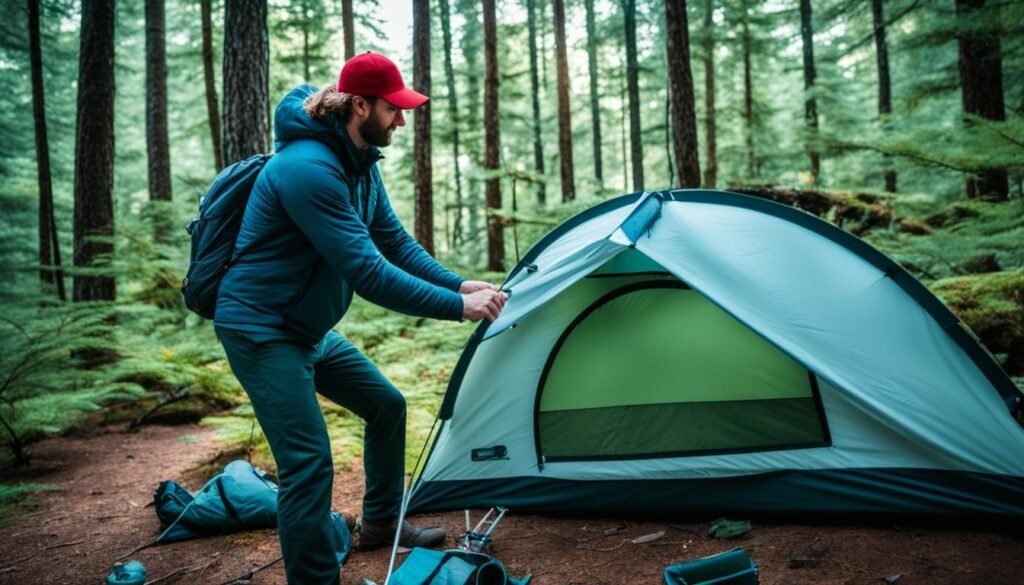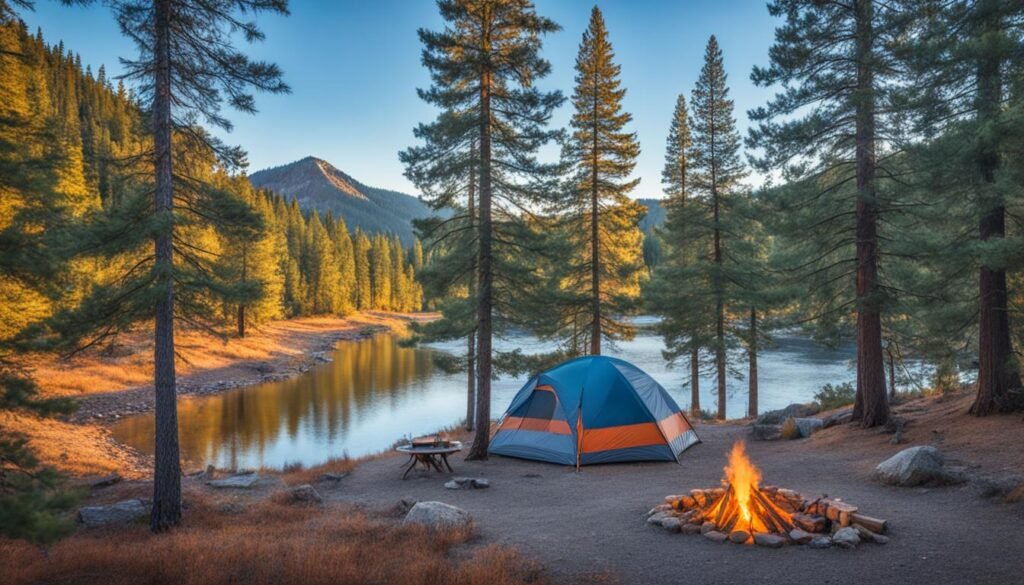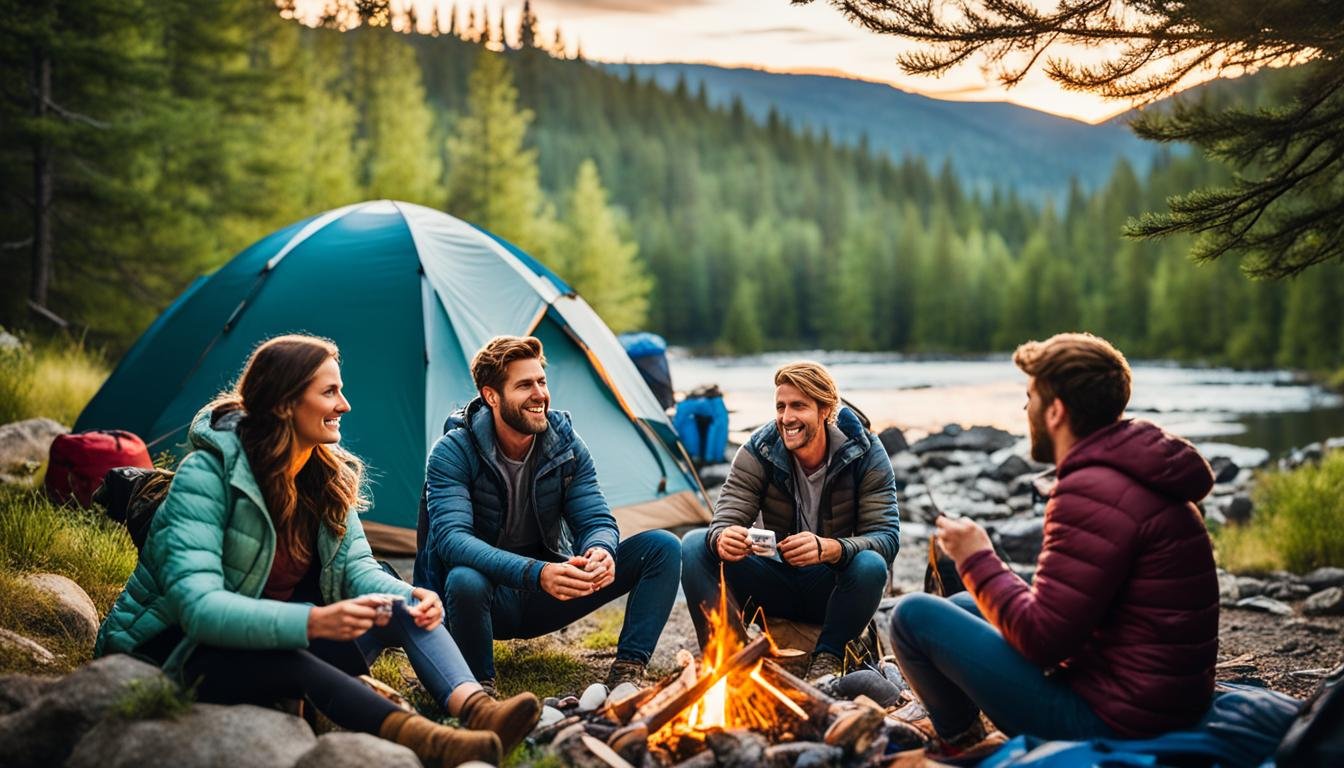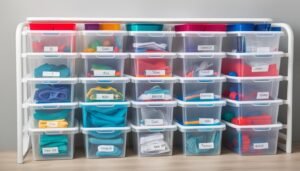Camping is an incredible adventure that allows you to disconnect from the noise of the city and reconnect with nature. Picture this – the crisp morning air filling your lungs, the sound of birds chirping, and the warmth of a crackling campfire. camping for beginners a perfect escape, isn’t it?
Now, let me take you back to my first camping experience. I was a total novice, armed with enthusiasm and a checklist of camping essentials. I set off on my expedition, ready to conquer the great outdoors. Little did I know that nature had a few lessons in store for me.
My adventure began with pitching the tent. As I wrestled with tent poles and fumbled with stakes, it became evident that my tent assembly skills were less than stellar. But my determination prevailed, and after a few tries (and laughs), I managed to create a cozy shelter.
The next lesson came in the form of meal planning. I had grand visions of gourmet campfire feasts, but reality set in when I realized that simplicity was key. Sandwiches, hotdogs, and s’mores became my camping culinary staples.
Throughout my trip, I discovered the importance of being prepared. From packing the right camping gear to considering safety measures, every aspect demanded attention. But amidst the challenges, there were moments of sheer bliss – hiking to breathtaking vistas, stargazing under a clear night sky, and sharing stories by the campfire.
So, whether you’re a complete camping newbie like I was or a seasoned adventurer looking for new tips, this beginner’s guide to camping is here to help. We’ll dive into essential tips and must-have gear to ensure your camping trip is a memorable success.
Key Takeaways:
- Embark on a camping adventure to disconnect from the city and reconnect with nature.
- When pitching a tent, embrace the learning curve and enjoy the process.
- Simplify your camping meals for an easier and more enjoyable experience.
- Be prepared with the right gear and prioritize safety.
- Embrace the moments of bliss and make lasting memories in the great outdoors.
How to Start Camping
So, you’ve decided to embark on your first camping adventure. Congratulations! Camping is a fantastic way to connect with nature, unwind, and create lasting memories. But before you head out into the wilderness, it’s important to know how to choose the right camping shelter. And when it comes to camping shelters, tents are your best bet as a beginner.
Why choose a tent, you ask? Well, tents are not only portable and easy to set up, but they also offer the flexibility to adapt to different camping environments. Whether you’re camping in the mountains, on a beach, or in a forest, a tent provides the comfort and protection you need.
When selecting a tent, there are a few factors to consider:
- Your needs: Are you camping alone or with a group? Do you prefer more room or a cozy space?
- The weather: Will you be camping in warm or cold conditions? Is rain or wind a potential factor?
- Your experience level: Are you a novice camper or an experienced outdoors enthusiast?
Considering these factors will help you determine the size, design, and features of your tent. Whether you opt for a spacious family tent, a lightweight backpacking tent, or a versatile dome tent, make sure it suits your specific needs.
Once you’ve chosen the perfect tent, it’s time to learn the art of pitching it. Proper tent setup is essential for a comfortable camping experience. Here are a few tips to get you started:
- Practice at home: Familiarize yourself with the tent assembly instructions before your camping trip. Set up the tent in your backyard or living room to become comfortable with the process.
- Choose a level spot: Find a flat, even surface to pitch your tent. Clear any rocks, sticks, or debris that may interfere with the tent’s foundation.
- Secure with tent stakes: Use sturdy tent stakes to secure the corners and edges of your tent. This will help prevent it from shifting or collapsing in windy conditions.
- Consider comfort and airflow: Maximize your camping comfort by selecting a tent with proper ventilation and mesh panels for airflow. This will help regulate temperature and reduce condensation inside the tent.
Tent Pitching Tips:
“Pitching a tent may seem intimidating at first, but with a little practice, it becomes a breeze. Remember to take your time and follow the instructions. Trust me, once you get the hang of it, you’ll be camping like a pro!”
Now that you know how to choose and pitch a tent, you’re ready to embark on your camping adventure. Get out there, breathe in the fresh air, and immerse yourself in the beauty of nature!
Tips for Pitching a Tent
Assembling your tent correctly is crucial for a successful camping trip. To ensure a comfortable and enjoyable experience, follow these handy tips:
- Understand your tent type: Familiarize yourself with the specific features and design of your tent. Different tents have different assembly methods, so read the instructions carefully.
- Choose a level spot: Find a flat and even surface to pitch your tent. Avoid areas with rocks, roots, or other sharp objects that may damage the tent floor or cause discomfort while sleeping.
- Mindful tent stakes: Use sturdy tent stakes to secure your tent properly. Make sure they are deep enough in the ground to provide stability, especially in windy conditions.
- Extra weather protection: Enhance your tent’s weather resistance by using a tarp underneath. This additional layer helps prevent moisture seepage from the ground and provides an extra barrier against rain.
- Consider comfort: Make your tent more comfortable by paying attention to ventilation, natural light, and sleeping arrangements. Leave windows or vents open for airflow and freshness. Utilize the tent’s built-in pockets or create a cozy corner with a small portable table or a battery-powered lamp.
- Get off the ground: Sleeping directly on the tent floor can be uncomfortable. Bring a sleeping pad or an air mattress to elevate your sleeping surface and add an extra layer of insulation.
By following these tips, you’ll be able to set up your tent with ease and enjoy a comfortable camping experience. Remember, proper tent assembly and attention to detail are essential for a successful trip.

Tent Camping vs. Lodging Options
When it comes to camping, there’s no one-size-fits-all approach. As a beginner, it’s important to explore different lodging options and find the one that suits your preferences. From rustic cabins to luxurious glamping experiences and the convenience of RVs, there’s something for everyone. Let’s take a closer look at each option:
Cabins
If you’re looking for a cozy and comfortable camping experience, cabins are a fantastic choice. These enclosed shelters provide a roof over your head and often come with amenities like beds, kitchenettes, and even bathrooms. It’s like having a home away from home in the wilderness. You can enjoy the beauty of nature during the day and retreat to your cozy cabin at night.
Here’s a snapshot of the pros and cons of cabin camping:
| Pros | Cons |
|---|---|
|
|
Glamping
If you’re craving a unique camping experience with a touch of glamour, glamping is the way to go. Glamping combines the luxury of a hotel room with the beauty of the great outdoors. You can stay in beautifully decorated tents or even treehouses, complete with comfortable beds, stylish furnishings, and sometimes even private bathrooms. It’s camping without sacrificing comfort and style.https://daisycollinscreations.com/travel/camping/
Let’s weigh the pros and cons of glamping:
| Pros | Cons |
|---|---|
|
|
RVs
If you’re seeking flexibility and comfort, RV camping is worth considering. With an RV, you have the freedom to travel and camp in different locations while enjoying the convenience of a fully-equipped vehicle. RVs come in various sizes, from compact campervans to spacious motorhomes with all the amenities you need. It’s like having a portable home on wheels.
Let’s explore the pros and cons of RV camping:
| Pros | Cons |
|---|---|
|
|
I always say, there’s no right or wrong way to camp. It all depends on your preferences and what you’re looking to get out of the experience. Whether you choose a cozy cabin, a glamorous glamping adventure, or the flexibility of an RV, the key is to enjoy nature and make lasting memories.
Regardless of the lodging option you choose, it’s important to practice good camping etiquette. Respect your fellow campers, be mindful of noise levels, and always leave your campsite clean and free of trash. Let’s protect and preserve the beauty of our outdoor spaces for generations to come.
Remember, whether you’re in a cabin, a glamorous tent, or an RV, the most important thing is to have fun and embrace the adventure that camping brings. Happy camping!
Choosing a Location for Your First Camping Trip
Selecting the perfect location for your first camping trip is a crucial step towards creating an unforgettable outdoor experience. To ensure you have a fantastic time, consider your camping goals, the season, and the accessibility of the campsite. As a beginner, it’s essential to choose a location that caters to your needs and offers amenities for a comfortable stay.
When deciding on a camping location, ask yourself: What are my camping goals? Do I want to explore nature, hike scenic trails, or relax by a serene lake? Identifying your objectives will help you narrow down the options and choose a site that aligns with your interests.
Seasonal considerations are also vital camping for beginners.Depending on the time of year, certain destinations offer unique experiences. For example, camping during fall foliage season can treat you to breathtaking colors, while summertime provides opportunities for swimming and water activities. Research the climate and natural highlights of your chosen season to make the most of your camping adventure.
Accessibility is another critical factor to keep in mind. As a beginner, you may prefer campsites that are easily accessible by car or public transportation. Look for campsites with well-maintained roads and clear directions to avoid any unnecessary stress. Additionally, consider the amenities available at the campsite, such as clean facilities, picnic areas, and on-site activities.
If you’re camping for beginners with convenient amenities and facilities, Kampgrounds of America (KOA) is an excellent option. KOA campgrounds are known for their welcoming atmosphere, clean facilities, and a range of amenities including showers, Wi-Fi, and even swimming pools. Choosing a KOA campground can provide peace of mind and ensure a comfortable introduction to camping.
Remember, the location you choose sets the stage for your camping adventure. Take the time to research and select a campsite that suits your preferences and needs. By considering your camping goals, the season, and the accessibility of the campsite, you’ll be well on your way to an amazing first camping trip.

| Pros | Cons |
|---|---|
| Accessible location for beginners | May be crowded during peak seasons |
| Offers amenities and facilities | May lack a secluded and immersive experience |
| Opportunities for on-site activities | May have limited wilderness appeal |
Choosing the right camping location is an exciting part of the journey. Consider your camping goals, the season, and the campsite’s accessibility to find the perfect spot that aligns with your preferences. Whether you choose a secluded forest campground or a family-friendly KOA, remember to embrace the beauty of nature and make lasting memories on your first camping trip.
Camping Essentials for Beginners
When it comes to camping, having the right gear can make or break your trip. As a beginner, it’s important to be well-prepared and have all the camping essentials at hand. Let me walk you through the must-have items for a successful camping adventure.
Shelter
Your tent is the centerpiece of your camping setup. Make sure to choose a tent that suits your needs and can accommodate the number of people in your group. Don’t forget to pack a sleeping bag and a sleeping pad for a comfortable night’s rest.
Lighting
When the sun goes down, proper lighting is crucial. Bring a headlamp or a lantern to illuminate your campsite and navigate during nighttime. It’s also handy for those late-night trips to the restroom.
Cooking Gear
Food is an important part of any camping trip. A portable stove, pots, pans, and utensils will come in handy for cooking delicious meals in the great outdoors. Additionally, don’t forget a cooler to keep your perishable items fresh.
Campsite Comfort
After a long day of adventure, you’ll want a cozy spot to relax and unwind. Pack some comfortable camp chairs to sit around the campfire and enjoy the serene ambiance of nature. Don’t forget a tablecloth and some picnic blankets for added comfort.
Clothing and Toiletries
Dress appropriately for the weather and pack extra layers to stay warm during chilly nights. Bring toiletries such as toothbrush, toothpaste, soap, and toilet paper for a comfortable camping experience.
First Aid Kit
Safety should always be a top priority when camping. Be prepared for any minor injuries or illnesses by packing a well-stocked first aid kit. Include items such as bandages, antiseptic wipes, pain relievers, and any necessary prescription medications.
Camping for Beginners Checklist
To ensure you don’t forget any essential items, use a camping checklist. It will help you stay organized and make sure you have everything you need for your trip. You can find printable camping checklists online or create your own personalized version.
Remember, camping is all about enjoying the great outdoors and creating lasting memories. By having the right gear and following these camping essentials, you’ll be well-prepared for an unforgettable adventure under the stars.
Food and Water Tips
When it comes to camping, food and water are essential for a successful trip. Here are some tips to ensure you stay fueled and hydrated during your outdoor adventure:
Meal Planning
Planning your camping meals in advance can save you time and effort. Opt for simple and delicious options that are easy to prepare and require minimal equipment. Consider packing ingredients for sandwiches, hotdogs, and smores. Don’t forget about protein bars and easy breakfast items for a quick and energizing start to your day.
“Campfire cooking is a true art. Embrace the flames and get creative with your meals!”
Water Supply
Proper hydration is crucial, so make sure to bring an ample water supply for drinking and cleaning purposes. Consider bringing a water pump to make access to water more convenient. Additionally, it’s a good idea to pack at least a gallon or so of water per person, depending on the length of your trip.
Food Storage
Properly storing your food is essential to prevent critters from scavenging. Use sealable containers or coolers to keep your food secure and fresh. It’s also important to clean up any food scraps and dispose of them properly to maintain the cleanliness of your campsite and respect the environment.
Must-Have Camping Food and Water Supply
| Food | Water |
|---|---|
| Sandwiches | Water pump |
| Hotdogs | Gallon of water |
| Smores | |
| Protein bars | |
| Easy breakfast items |
Source: Personal camping experience and recommendations from experienced campers.
Additional Tips and Hacks
Looking to take your camping experience to the next level? Here are some creative tips and handy hacks that will make your adventure in the great outdoors even better!
1. Hammer It Down
Don’t let wobbly tent stakes ruin your camping experience. Bring a trusty hammer or mallet to ensure your tent stakes are securely in place. This simple hack will give you a sturdy and reliable shelter, no matter the terrain.
2. Organize Like a Pro
Keep your camping gear neat and accessible by storing it in a sealable bin. This way, you’ll always know where key items are located, making setup and tear down a breeze. Plus, it helps keep your gear protected from the elements.
3. Outsmart the Critters
Don’t let pesky critters ruin your camping trip. Use trash bags or Ziplocs to seal food and garbage, keeping unwanted visitors at bay. Remember to dispose of your waste properly to maintain a clean and critter-free campsite.
4. Practice Good Camping Etiquette
Respect nature and fellow campers by practicing good camping etiquette. Leave No Trace principles are essential, so always clean up after yourself, minimize noise, and be mindful of your impact on the environment. Let’s keep our camping spots pristine for future adventurers!
“Camping allows me to disconnect from the hustle and bustle of daily life and reconnect with nature. These hacks and tips make the experience even more enjoyable and stress-free!”
– Happy Camper
Try out these tips and hacks on your next camping trip and watch your outdoor adventure reach new heights. Remember, camping is all about embracing nature, creating cherished memories, and having a blast!
Stay tuned for the conclusion of our Beginner’s Guide to Camping where we’ll recap the essential tips and provide you with the ultimate camping checklist. Happy camping, fellow adventurers!
Conclusion
Well, fellow adventurers, we’ve reached the end of this beginner’s guide to camping. I hope you’ve found the tips and advice provided helpful in preparing for your first camping trip. Remember, camping is all about embracing the great outdoors, having fun, and creating lasting memories.
As a beginner, it’s important to start with the basics. Choose the right shelter for your needs, whether it be a tent, a cabin, or an RV. Pack all the essential gear, from sleeping bags to cooking equipment, and don’t forget to plan your meals and bring enough water.
But above all, remember to enjoy the experience. Take in the beauty of nature, try new activities like hiking or fishing, and immerse yourself in the tranquility that camping offers. Whether you’re camping in a national park or a local campground, the adventure awaits. So, take a deep breath, set up your tent, and embark on your first camping adventure. Happy camping, and may your outdoor journeys be filled with joy, excitement, and unforgettable moments!
FAQ
What is the best camping shelter for beginners?
How do I pitch a tent correctly?
What are the different lodging options for camping?
How do I select the right location for my first camping trip?
What gear do I need for camping?
What should I pack for meals during camping?
Are there any additional tips and hacks for camping?
What are some camping safety tips?
Source Links
Choice Hotels - Go Places with Friends. Even the Furry Ones. Visit One of Our Pet-friendly Hotels!






